Unit 8 Have you read Treasure Island yet?Revision课件(共32张PPT)
文档属性
| 名称 | Unit 8 Have you read Treasure Island yet?Revision课件(共32张PPT) |
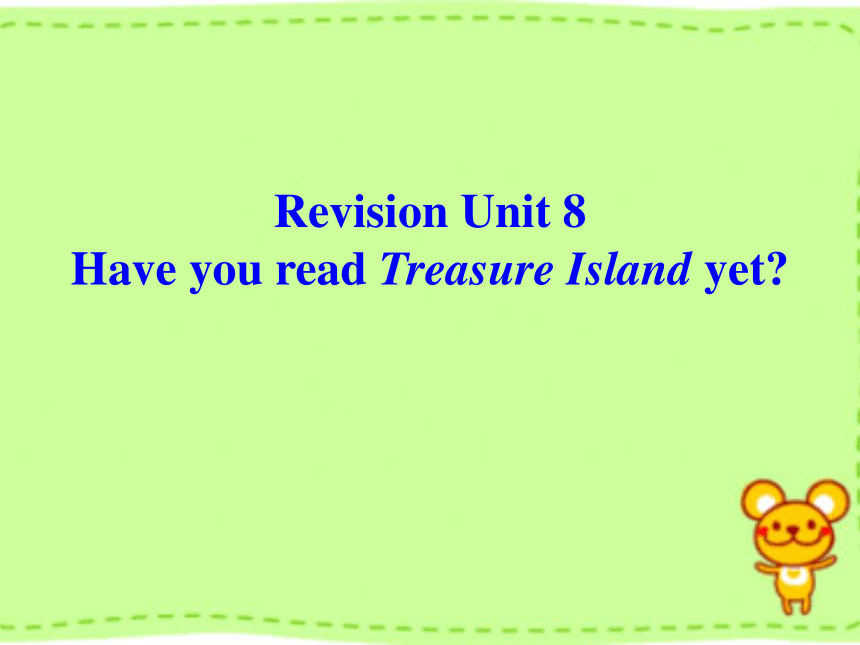
|
|
| 格式 | zip | ||
| 文件大小 | 1.9MB | ||
| 资源类型 | 教案 | ||
| 版本资源 | 人教新目标(Go for it)版 | ||
| 科目 | 英语 | ||
| 更新时间 | 2020-07-01 00:00:00 | ||
图片预览

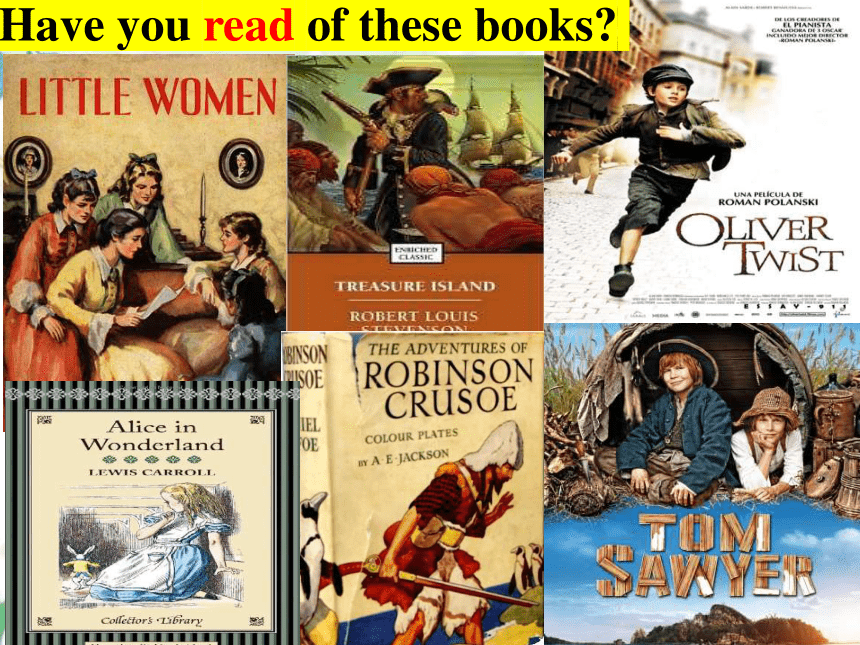
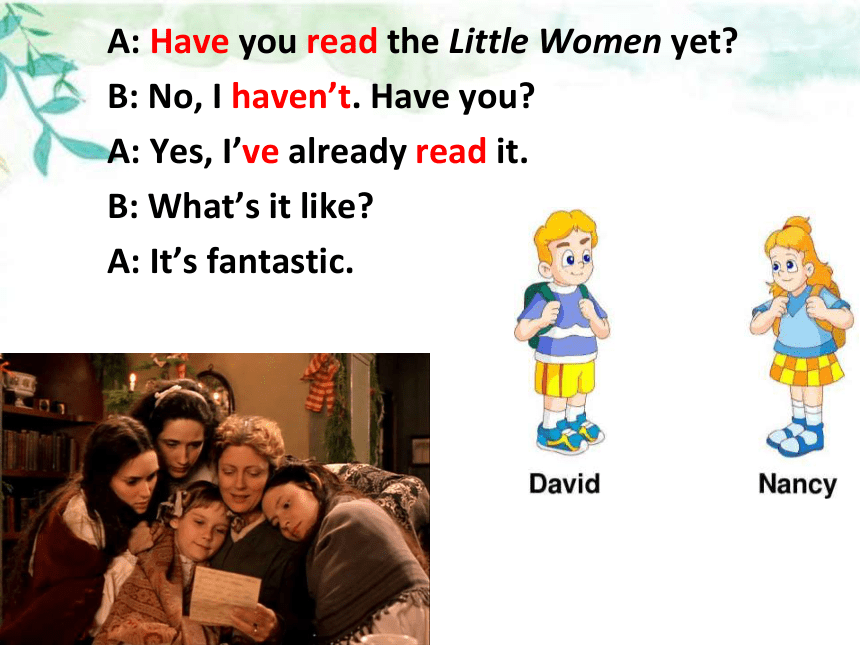
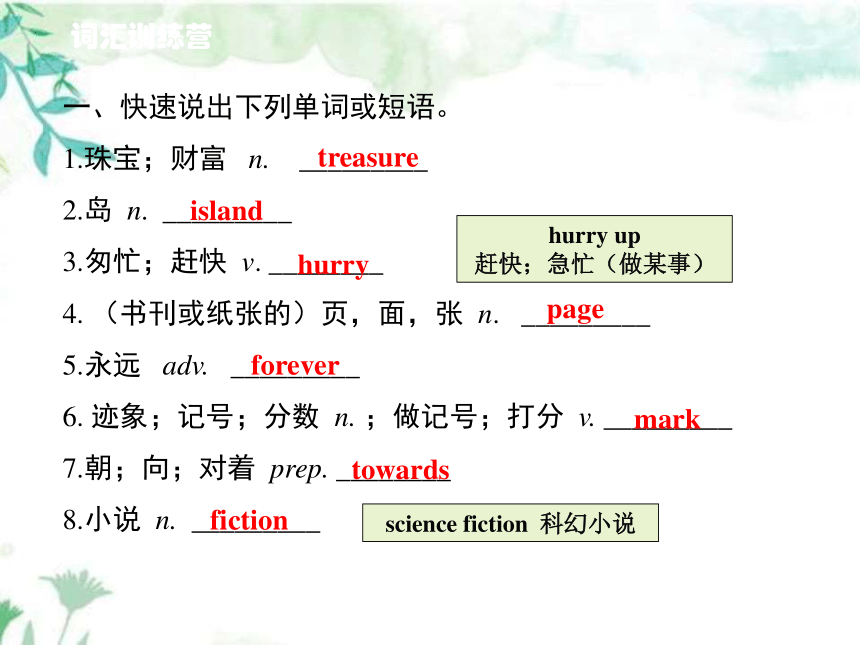
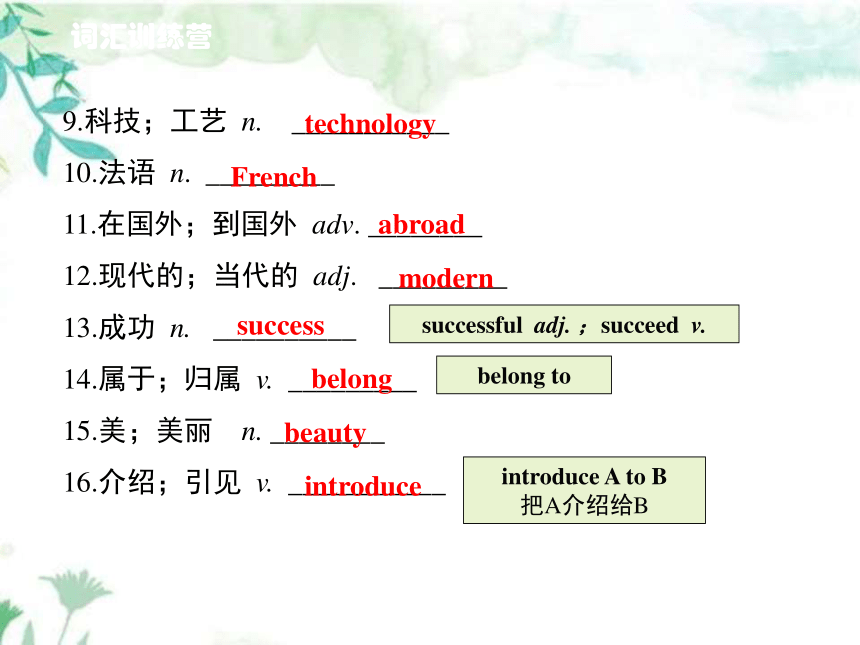
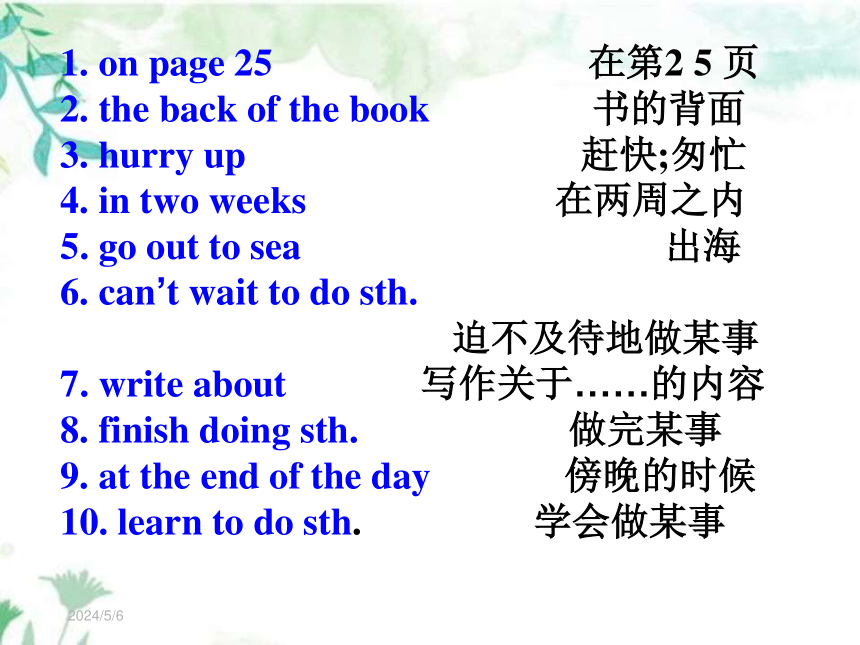
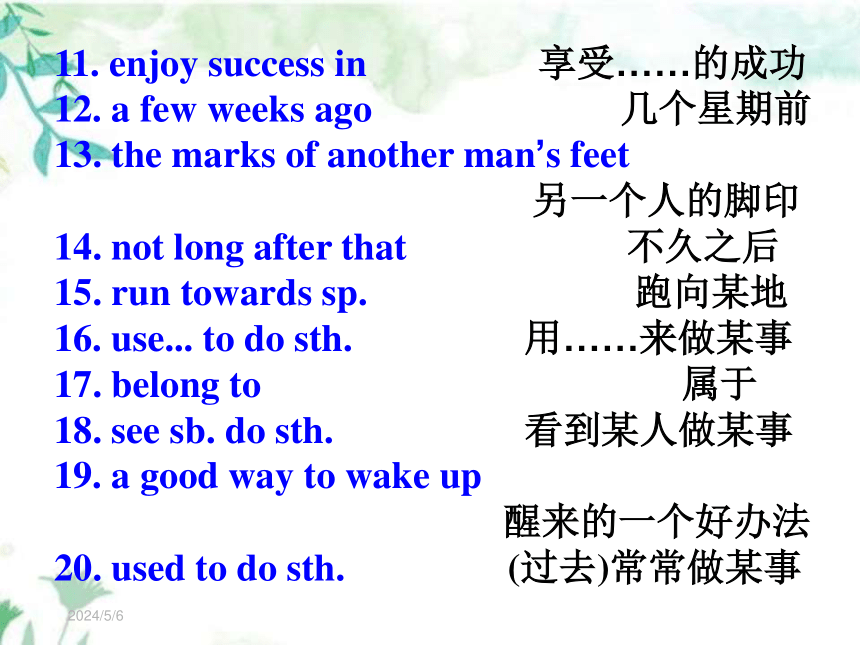
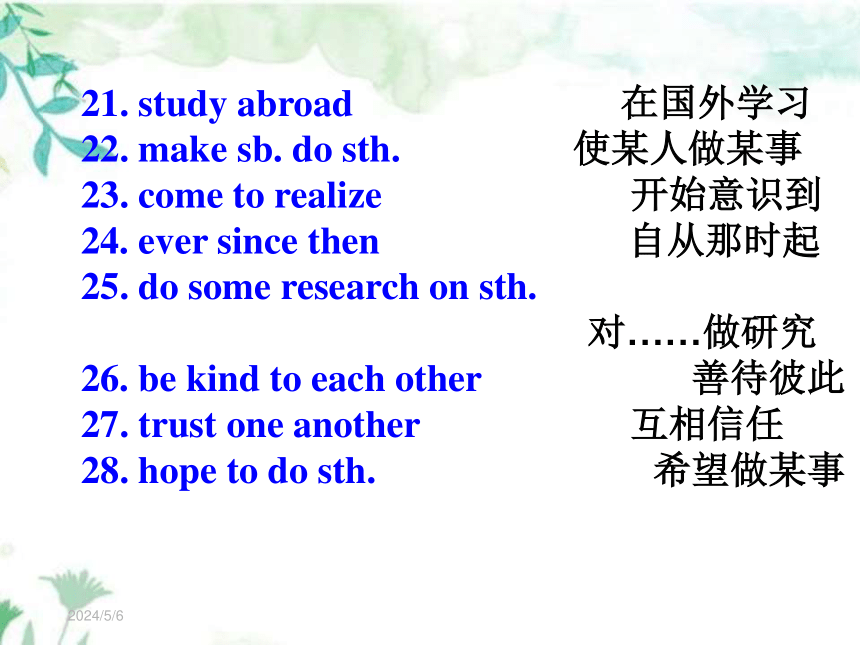
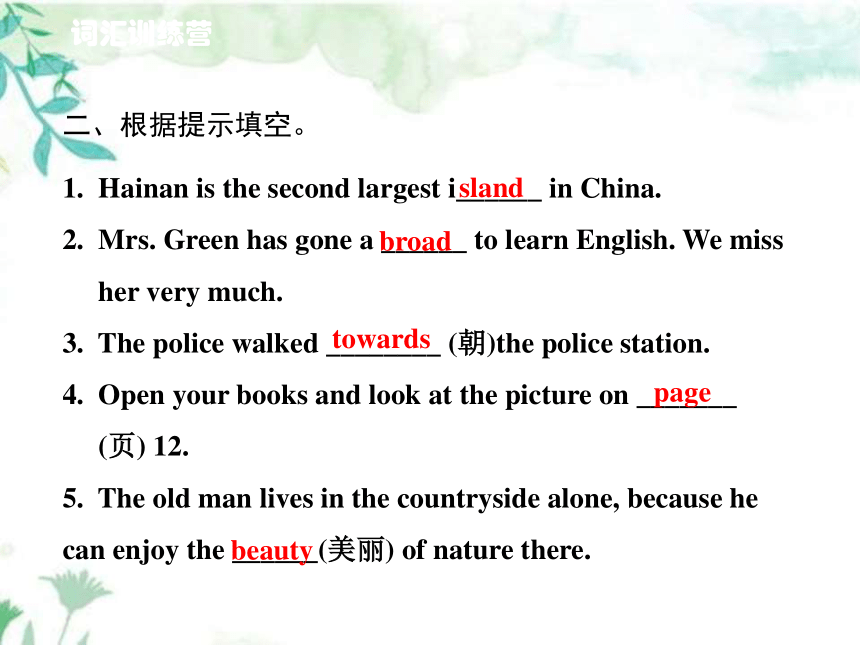
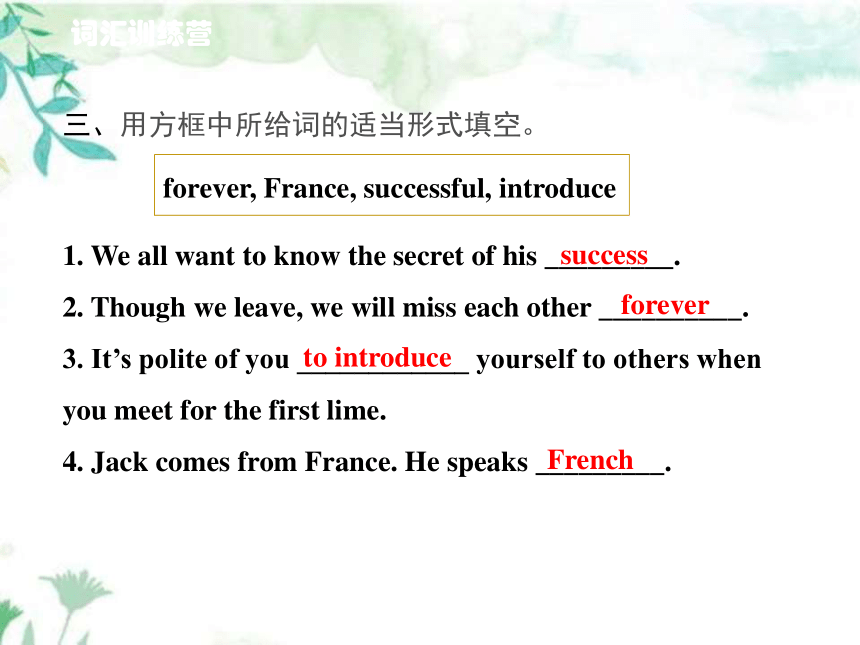
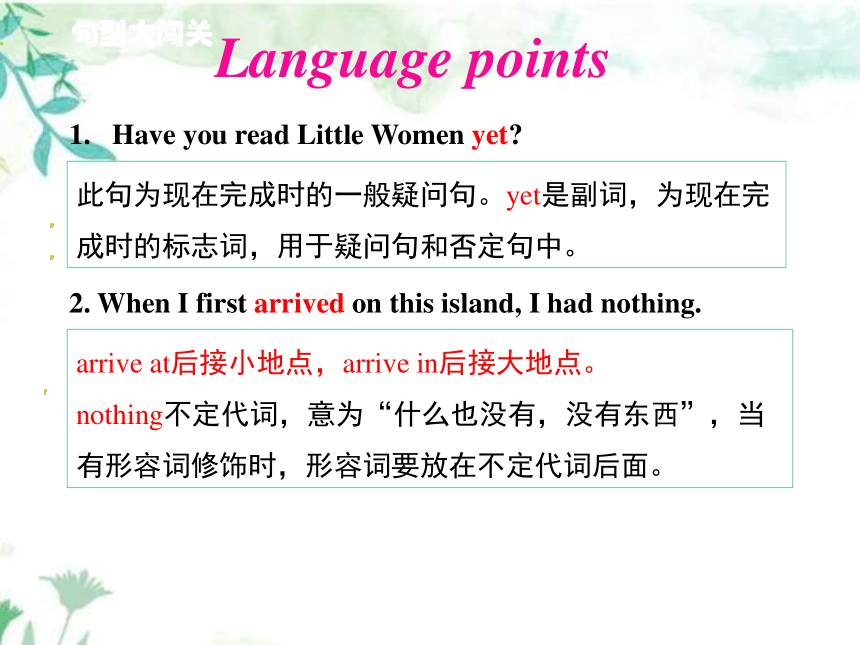
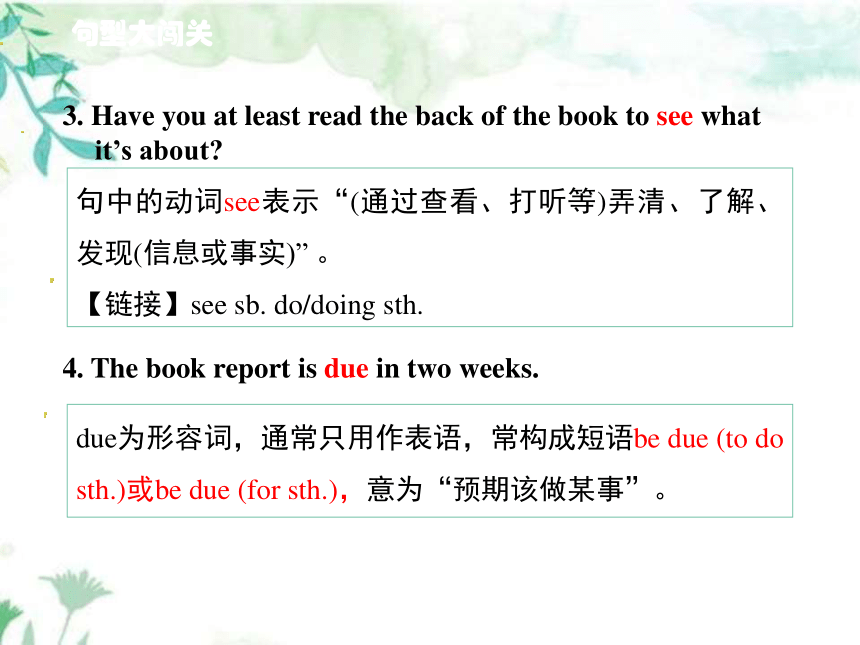
文档简介
(共32张PPT)
Revision
Unit
8
Have
you
read
Treasure
Island
yet?
A:
Have
you
read
the
Little
Women
yet?
B:
No,
I
haven’t.
Have
you?
A:
Yes,
I’ve
already
read
it.
B:
What’s
it
like?
A:
It’s
fantastic.
一、快速说出下列单词或短语。
1.珠宝;财富
n.
_________
2.岛
n.
_________
3.匆忙;赶快
v.
________
4.
(书刊或纸张的)页,面,张
n.
_________
5.永远
adv.
_________
6.
迹象;记号;分数
n.
;做记号;打分
v.
_________
7.朝;向;对着
prep.
________
8.小说
n.
_________
treasure
island
hurry?
page
forever
mark?
towards
fiction
hurry
up
赶快;急忙(做某事)
词汇训练营
science
fiction
科幻小说
9.科技;工艺
n.
___________
10.法语
n.
_________
11.在国外;到国外
adv.
________
12.现代的;当代的
adj.
_________
13.成功
n.
__________
14.属于;归属
v.
_________
15.美;美丽
n.
________
16.介绍;引见
v.
___________
technology?
French
abroad
modern?
success
belong
beauty?
introduce
successful
adj.
;succeed
v.
词汇训练营
belong
to
introduce
A
to
B
把A介绍给B
1.
on
page
25
在第2
5
页
2.
the
back
of
the
book
书的背面
3.
hurry
up
赶快;匆忙
4.
in
two
weeks
在两周之内
5.
go
out
to
sea
出海
6.
can’t
wait
to
do
sth.
迫不及待地做某事
7.
write
about
写作关于……的内容
8.
finish
doing
sth.
做完某事
9.
at
the
end
of
the
day
傍晚的时候
10.
learn
to
do
sth.
学会做某事
11.
enjoy
success
in
享受……的成功
12.
a
few
weeks
ago
几个星期前
13.
the
marks
of
another
man’s
feet
另一个人的脚印
14.
not
long
after
that
不久之后
15.
run
towards
sp.
跑向某地
16.
use...
to
do
sth.
用……来做某事
17.
belong
to
属于
18.
see
sb.
do
sth.
看到某人做某事
19.
a
good
way
to
wake
up
醒来的一个好办法
20.
used
to
do
sth.
(过去)常常做某事
21.
study
abroad
在国外学习
22.
make
sb.
do
sth.
使某人做某事
23.
come
to
realize
开始意识到
24.
ever
since
then
自从那时起
25.
do
some
research
on
sth.
对……做研究
26.
be
kind
to
each
other
善待彼此
27.
trust
one
another
互相信任
28.
hope
to
do
sth.
希望做某事
1.
Hainan
is
the
second
largest
i______
in
China.
2.
Mrs.
Green
has
gone
a
______
to
learn
English.
We
miss
her
very
much.
3.
The
police
walked
________
(朝)the
police
station.
4.
Open
your
books
and
look
at
the
picture
on
_______
(页)
12.
5.
The
old
man
lives
in
the
countryside
alone,
because
he
can
enjoy
the
______(美丽)
of
nature
there.
二、根据提示填空。
sland
broad
towards
page
beauty
词汇训练营
1.
We
all
want
to
know
the
secret
of
his
_________.
2.
Though
we
leave,
we
will
miss
each
other
__________.
3.
It’s
polite
of
you
____________
yourself
to
others
when
you
meet
for
the
first
lime.
4.
Jack
comes
from
France.
He
speaks
_________.
三、用方框中所给词的适当形式填空。
success
forever
to
introduce
French
词汇训练营
forever,
France,
successful,
introduce
Have
you
read
Little
Women
yet?
此句为现在完成时的一般疑问句。yet是副词,为现在完成时的标志词,用于疑问句和否定句中。
2.
When
I
first
arrived
on
this
island,
I
had
nothing.
arrive
at后接小地点,arrive
in后接大地点。
nothing不定代词,意为“什么也没有,没有东西”,当有形容词修饰时,形容词要放在不定代词后面。
句型大闯关
Language
points
3.
Have
you
at
least
read
the
back
of
the
book
to
see
what
it’s
about?
句中的动词see表示“(通过查看、打听等)弄清、了解、发现(信息或事实)”
。
【链接】see
sb.
do/doing
sth.
4.
The
book
report
is
due
in
two
weeks.
due为形容词,通常只用作表语,常构成短语be
due
(to
do
sth.)或be
due
(for
sth.),意为“预期该做某事”。
句型大闯关
5.
…,
Sally
looks
at
the
many
books
she
hasn’t
read
(not
read
)
yet
and
she
can’t
wait
to
read
them!
can’t
wait
to
do
sth
迫不及待地做某事
wait
for
等候
(后接名词、代词)
6.
When
Sarah
was
a
teenager,
she
used
to
fight
over
almost
everything
with
her
family.
fight
over
“为……争吵”;
fight
for
+
名词(事业、自由、权利等)
“为......而斗争”;
have
a
fight
with
和……打了一架。
句型大闯关
7.
But
five
years
ago,
while
she
was
studying
abroad
in
England,
….
abroad表示到(在)国外,是副词,前面不加介词。
go
abroad
出国;live
abroad
住在国外;
at
home
and
abroad
在国内外。
1.
ever
since
自从……以来;ever
since
作连词时=since,ever起强调作用,主句常用现在完成时。
2.
ever
since表示自那以后
8.
Ever
since
then,
she
has
been
a
fan
of
American
country
music.
句型大闯关
9.
…,
such
as
the
importance
of
money
and
success,
but
not
about
belonging
to
a
group.
belong
to
“属于,是……成员”,不能用于进行时态或被动形式,其主语常常是物。
句型大闯关
be
kind
to
“对……友好”=
be
friendly
to
be
kind
to
each
other
“善待彼此”
trust
one
another
“互相信任”
10.
However,
country
music
brings
us
back
to
the
“good
old
day”
when
people
were
kind
to
each
other
and
trusted
one
another.
一、完成句子。
1.
我们迫不及待地要去旅行。
We
______
______
______
______.
2.
从那以后她就是一名乡村乐迷了。
______
______
______,
she
was
a
country
music
fan.
3.
校运动会预期在一周以后。
The
school
sports
meeting
______
______
in
a
week.
can’t
wait
to
travel
Ever
since
then
is
due
句型大闯关
二、单项选择。
1.
I
met
Lucy
in
the
primary
school
and
we
have
been
close
friends
____.
as
usual
B.
again
and
again
sooner
or
later
D.
ever
since
2.
—Have
you
watered
the
plants
____?
—Yes,
I
have.
A.
already
B.
yet
C.
never
D.
ever
句型大闯关
3.
I
saw
Tony
____
basketball
with
Jack
an
hour
ago.
A.
plays
B.
to
play
C.
played
D.
play
4.
—What
else
do
you
need
for
your
trip?
—____
else.
I’ve
packed
everything.
Something
B.
Everything
C.
Nothing
D.
Anything
句型大闯关
一.
用法
1.
表示过去发生或已经完成的某一动作
对现在造成的影响或结果。
Have
you
had
your
lunch
yet?
Yes,
I
have.
I’ve
just
had
it.
2.
表示从过去某一时刻开始,一直延续到
现在的动作或状态。
They
have
lived
here
since
1996.
Grammar
二.
现在完成时的构成及句式转换
现在完成时由“助动词
have
/
has
+
动词的过去分词”构成。
1.
肯定句:
主语
+
have
/
has
+
过去分词
+
其他
2.
否定句:
主语
+
have
/
has
+
not
+
过去分词
+
其他
3.
一疑句:
have
/
has
+
主语
+
过去分词+
其他
haven’t
hasn’t
动词过去分词的变化和过去式的变化
类似,分规则变化和不规则变化两种。
三.
动词过去分词的变化规则
1.
不规则变化
(课本137、136页)
begin-began-begun
let-let-let
know-knew-known
eat-ate-eaten
stand-stood-stood
come-came-come
2.
规则变化
1).
一般在动词词尾直接加ed。
pick
→
picked
→
picked
wish
→
wished
→
wished
stay
→
stayed
→
stayed
2).
以不发音的e结尾的动词后面加d。
like
→
liked
→
liked;
hope
→
hoped
→
hoped;
phone
→
phoned
→
phoned
3).
以“辅音字母
+
y”结尾的动词,
变y为i,再加-ed。
study
→
studied
→
studied
hurry
→
hurried
→
hurried
reply
→
replied
→
replied
4).
词尾是重读闭音节的动词,要双写辅音字母,再加-ed。
stop
→
stopped
→
stopped
clap
→
clapped
→
clapped
四.
现在完成时的标志词
1.
常与
just,
already,
yet,
ever,
never,
before,
so
far
等连用,强调动作的完成,
不强调动作的持续。
Have
you
ever
been
to
Japan?
I
have
just
finished
my
homework.
He
has
already
taught
me
some
English.
四.
现在完成时的标志词
2.
for
+
时间段,
since
+
时间点
,
since
+
时间段
ago,
since
+
一般过去时的句子。
They
have
stayed
there
since
1997.
I
have
learned
English
for
six
years.
He
has
lived
here
since
he
was
a
child.
She
has
worked
here
since
two
years
ago.
五.
already和yet用法
◆
already
“已经”,一般用于肯定句中,
放have/has后,过去分词前或句尾。
I
have
already
read
the
book.
Some
visitors
have
come
already.
◆
already用于疑问句中时通常表示惊奇。
Have
you
finished
your
homework
already?
I
can’t
believe
it.
◆
yet
用于疑问句中意为“已经”,用来询问
说话人期望发生的事情是否已经发生;
用于否定句中,意为“还”,表示说话人
期望发生的事情尚未发生。yet
通常放在句尾。
Have
you
seen
her
yet?
I
haven’t
found
my
pen
yet.
语法加油站
一、句型转换。
1.
I’ve
already
had
dinner.(改为一般疑问句)
_____
you
_____
dinner
______?
2.
He
has
just
finished
his
homework.(改为否定句)
He
______
__________
his
homework
_____.
3.
Mum’s
cooked
the
dinner.
(改为否定句)
Mum
_______
_______
the
dinner.
Have
had
yet
hasn’t
finished
yet
hasn’t
cooked
语法加油站
二、单项选择
(
)
1.
—
______
you
ever
______
with
a
group?
—
Yes,
I
have.
A.
Did;
study
B.
Are;
studying
C.
Were;
studying
D.
Have;
studied
(
)
2.
How
many
times
_____
you
_____
to
Beijing
this
year?
A.
have;
been
B.
did;
been
C.
have;
gone
D.
did;
gone
D
A
语法加油站
(
)3.
—
Have
you
taken
out
the
trash,
Belly?
—
______.
I’ll
do
it
right
away.
A.
Sorry,
I
have
B.
No,
I
didn’t
C.
No,
I
don’t
D.
Not
yet
(
)4.
—
Have
you
_______
visited
Shanghai?
—
No,
_______.
A.
ever;
not
B.
never;
not
C.
ever;
never
D.
never;
ever
D
C
1.
Have
you
ever
______(take)
a
train?
2.
I
_____(have)
my
lunch
and
I'm
not
hungry
now.
3.
We
______(be)
good
friends
since
we
met
at
school.
4.
We
can't
find
him
anywhere.
Perhaps
he______
(go)
home.
5.
He
________(read)
the
book
before.
6.
Mr.
Green
_________(teach)
us
a
lot
about
social
studies
since
September.
taken
have
had
have
been
has
gone
has
read
has
taught
三、完成句子。
Homework
for
today
1.
Recite
the
words
and
phrases
in
this
unit.
2.
Read
the
listening
material
on
Page
104-
105.
Revision
Unit
8
Have
you
read
Treasure
Island
yet?
A:
Have
you
read
the
Little
Women
yet?
B:
No,
I
haven’t.
Have
you?
A:
Yes,
I’ve
already
read
it.
B:
What’s
it
like?
A:
It’s
fantastic.
一、快速说出下列单词或短语。
1.珠宝;财富
n.
_________
2.岛
n.
_________
3.匆忙;赶快
v.
________
4.
(书刊或纸张的)页,面,张
n.
_________
5.永远
adv.
_________
6.
迹象;记号;分数
n.
;做记号;打分
v.
_________
7.朝;向;对着
prep.
________
8.小说
n.
_________
treasure
island
hurry?
page
forever
mark?
towards
fiction
hurry
up
赶快;急忙(做某事)
词汇训练营
science
fiction
科幻小说
9.科技;工艺
n.
___________
10.法语
n.
_________
11.在国外;到国外
adv.
________
12.现代的;当代的
adj.
_________
13.成功
n.
__________
14.属于;归属
v.
_________
15.美;美丽
n.
________
16.介绍;引见
v.
___________
technology?
French
abroad
modern?
success
belong
beauty?
introduce
successful
adj.
;succeed
v.
词汇训练营
belong
to
introduce
A
to
B
把A介绍给B
1.
on
page
25
在第2
5
页
2.
the
back
of
the
book
书的背面
3.
hurry
up
赶快;匆忙
4.
in
two
weeks
在两周之内
5.
go
out
to
sea
出海
6.
can’t
wait
to
do
sth.
迫不及待地做某事
7.
write
about
写作关于……的内容
8.
finish
doing
sth.
做完某事
9.
at
the
end
of
the
day
傍晚的时候
10.
learn
to
do
sth.
学会做某事
11.
enjoy
success
in
享受……的成功
12.
a
few
weeks
ago
几个星期前
13.
the
marks
of
another
man’s
feet
另一个人的脚印
14.
not
long
after
that
不久之后
15.
run
towards
sp.
跑向某地
16.
use...
to
do
sth.
用……来做某事
17.
belong
to
属于
18.
see
sb.
do
sth.
看到某人做某事
19.
a
good
way
to
wake
up
醒来的一个好办法
20.
used
to
do
sth.
(过去)常常做某事
21.
study
abroad
在国外学习
22.
make
sb.
do
sth.
使某人做某事
23.
come
to
realize
开始意识到
24.
ever
since
then
自从那时起
25.
do
some
research
on
sth.
对……做研究
26.
be
kind
to
each
other
善待彼此
27.
trust
one
another
互相信任
28.
hope
to
do
sth.
希望做某事
1.
Hainan
is
the
second
largest
i______
in
China.
2.
Mrs.
Green
has
gone
a
______
to
learn
English.
We
miss
her
very
much.
3.
The
police
walked
________
(朝)the
police
station.
4.
Open
your
books
and
look
at
the
picture
on
_______
(页)
12.
5.
The
old
man
lives
in
the
countryside
alone,
because
he
can
enjoy
the
______(美丽)
of
nature
there.
二、根据提示填空。
sland
broad
towards
page
beauty
词汇训练营
1.
We
all
want
to
know
the
secret
of
his
_________.
2.
Though
we
leave,
we
will
miss
each
other
__________.
3.
It’s
polite
of
you
____________
yourself
to
others
when
you
meet
for
the
first
lime.
4.
Jack
comes
from
France.
He
speaks
_________.
三、用方框中所给词的适当形式填空。
success
forever
to
introduce
French
词汇训练营
forever,
France,
successful,
introduce
Have
you
read
Little
Women
yet?
此句为现在完成时的一般疑问句。yet是副词,为现在完成时的标志词,用于疑问句和否定句中。
2.
When
I
first
arrived
on
this
island,
I
had
nothing.
arrive
at后接小地点,arrive
in后接大地点。
nothing不定代词,意为“什么也没有,没有东西”,当有形容词修饰时,形容词要放在不定代词后面。
句型大闯关
Language
points
3.
Have
you
at
least
read
the
back
of
the
book
to
see
what
it’s
about?
句中的动词see表示“(通过查看、打听等)弄清、了解、发现(信息或事实)”
。
【链接】see
sb.
do/doing
sth.
4.
The
book
report
is
due
in
two
weeks.
due为形容词,通常只用作表语,常构成短语be
due
(to
do
sth.)或be
due
(for
sth.),意为“预期该做某事”。
句型大闯关
5.
…,
Sally
looks
at
the
many
books
she
hasn’t
read
(not
read
)
yet
and
she
can’t
wait
to
read
them!
can’t
wait
to
do
sth
迫不及待地做某事
wait
for
等候
(后接名词、代词)
6.
When
Sarah
was
a
teenager,
she
used
to
fight
over
almost
everything
with
her
family.
fight
over
“为……争吵”;
fight
for
+
名词(事业、自由、权利等)
“为......而斗争”;
have
a
fight
with
和……打了一架。
句型大闯关
7.
But
five
years
ago,
while
she
was
studying
abroad
in
England,
….
abroad表示到(在)国外,是副词,前面不加介词。
go
abroad
出国;live
abroad
住在国外;
at
home
and
abroad
在国内外。
1.
ever
since
自从……以来;ever
since
作连词时=since,ever起强调作用,主句常用现在完成时。
2.
ever
since表示自那以后
8.
Ever
since
then,
she
has
been
a
fan
of
American
country
music.
句型大闯关
9.
…,
such
as
the
importance
of
money
and
success,
but
not
about
belonging
to
a
group.
belong
to
“属于,是……成员”,不能用于进行时态或被动形式,其主语常常是物。
句型大闯关
be
kind
to
“对……友好”=
be
friendly
to
be
kind
to
each
other
“善待彼此”
trust
one
another
“互相信任”
10.
However,
country
music
brings
us
back
to
the
“good
old
day”
when
people
were
kind
to
each
other
and
trusted
one
another.
一、完成句子。
1.
我们迫不及待地要去旅行。
We
______
______
______
______.
2.
从那以后她就是一名乡村乐迷了。
______
______
______,
she
was
a
country
music
fan.
3.
校运动会预期在一周以后。
The
school
sports
meeting
______
______
in
a
week.
can’t
wait
to
travel
Ever
since
then
is
due
句型大闯关
二、单项选择。
1.
I
met
Lucy
in
the
primary
school
and
we
have
been
close
friends
____.
as
usual
B.
again
and
again
sooner
or
later
D.
ever
since
2.
—Have
you
watered
the
plants
____?
—Yes,
I
have.
A.
already
B.
yet
C.
never
D.
ever
句型大闯关
3.
I
saw
Tony
____
basketball
with
Jack
an
hour
ago.
A.
plays
B.
to
play
C.
played
D.
play
4.
—What
else
do
you
need
for
your
trip?
—____
else.
I’ve
packed
everything.
Something
B.
Everything
C.
Nothing
D.
Anything
句型大闯关
一.
用法
1.
表示过去发生或已经完成的某一动作
对现在造成的影响或结果。
Have
you
had
your
lunch
yet?
Yes,
I
have.
I’ve
just
had
it.
2.
表示从过去某一时刻开始,一直延续到
现在的动作或状态。
They
have
lived
here
since
1996.
Grammar
二.
现在完成时的构成及句式转换
现在完成时由“助动词
have
/
has
+
动词的过去分词”构成。
1.
肯定句:
主语
+
have
/
has
+
过去分词
+
其他
2.
否定句:
主语
+
have
/
has
+
not
+
过去分词
+
其他
3.
一疑句:
have
/
has
+
主语
+
过去分词+
其他
haven’t
hasn’t
动词过去分词的变化和过去式的变化
类似,分规则变化和不规则变化两种。
三.
动词过去分词的变化规则
1.
不规则变化
(课本137、136页)
begin-began-begun
let-let-let
know-knew-known
eat-ate-eaten
stand-stood-stood
come-came-come
2.
规则变化
1).
一般在动词词尾直接加ed。
pick
→
picked
→
picked
wish
→
wished
→
wished
stay
→
stayed
→
stayed
2).
以不发音的e结尾的动词后面加d。
like
→
liked
→
liked;
hope
→
hoped
→
hoped;
phone
→
phoned
→
phoned
3).
以“辅音字母
+
y”结尾的动词,
变y为i,再加-ed。
study
→
studied
→
studied
hurry
→
hurried
→
hurried
reply
→
replied
→
replied
4).
词尾是重读闭音节的动词,要双写辅音字母,再加-ed。
stop
→
stopped
→
stopped
clap
→
clapped
→
clapped
四.
现在完成时的标志词
1.
常与
just,
already,
yet,
ever,
never,
before,
so
far
等连用,强调动作的完成,
不强调动作的持续。
Have
you
ever
been
to
Japan?
I
have
just
finished
my
homework.
He
has
already
taught
me
some
English.
四.
现在完成时的标志词
2.
for
+
时间段,
since
+
时间点
,
since
+
时间段
ago,
since
+
一般过去时的句子。
They
have
stayed
there
since
1997.
I
have
learned
English
for
six
years.
He
has
lived
here
since
he
was
a
child.
She
has
worked
here
since
two
years
ago.
五.
already和yet用法
◆
already
“已经”,一般用于肯定句中,
放have/has后,过去分词前或句尾。
I
have
already
read
the
book.
Some
visitors
have
come
already.
◆
already用于疑问句中时通常表示惊奇。
Have
you
finished
your
homework
already?
I
can’t
believe
it.
◆
yet
用于疑问句中意为“已经”,用来询问
说话人期望发生的事情是否已经发生;
用于否定句中,意为“还”,表示说话人
期望发生的事情尚未发生。yet
通常放在句尾。
Have
you
seen
her
yet?
I
haven’t
found
my
pen
yet.
语法加油站
一、句型转换。
1.
I’ve
already
had
dinner.(改为一般疑问句)
_____
you
_____
dinner
______?
2.
He
has
just
finished
his
homework.(改为否定句)
He
______
__________
his
homework
_____.
3.
Mum’s
cooked
the
dinner.
(改为否定句)
Mum
_______
_______
the
dinner.
Have
had
yet
hasn’t
finished
yet
hasn’t
cooked
语法加油站
二、单项选择
(
)
1.
—
______
you
ever
______
with
a
group?
—
Yes,
I
have.
A.
Did;
study
B.
Are;
studying
C.
Were;
studying
D.
Have;
studied
(
)
2.
How
many
times
_____
you
_____
to
Beijing
this
year?
A.
have;
been
B.
did;
been
C.
have;
gone
D.
did;
gone
D
A
语法加油站
(
)3.
—
Have
you
taken
out
the
trash,
Belly?
—
______.
I’ll
do
it
right
away.
A.
Sorry,
I
have
B.
No,
I
didn’t
C.
No,
I
don’t
D.
Not
yet
(
)4.
—
Have
you
_______
visited
Shanghai?
—
No,
_______.
A.
ever;
not
B.
never;
not
C.
ever;
never
D.
never;
ever
D
C
1.
Have
you
ever
______(take)
a
train?
2.
I
_____(have)
my
lunch
and
I'm
not
hungry
now.
3.
We
______(be)
good
friends
since
we
met
at
school.
4.
We
can't
find
him
anywhere.
Perhaps
he______
(go)
home.
5.
He
________(read)
the
book
before.
6.
Mr.
Green
_________(teach)
us
a
lot
about
social
studies
since
September.
taken
have
had
have
been
has
gone
has
read
has
taught
三、完成句子。
Homework
for
today
1.
Recite
the
words
and
phrases
in
this
unit.
2.
Read
the
listening
material
on
Page
104-
105.
同课章节目录
- Unit 1 What's the matter?
- Section A
- Section B
- Unit 2 I'll help to clean up the city parks.
- Section A
- Section B
- Unit 3 Could you please clean your room?
- Section A
- Section B
- Unit 4 Why don't you talk to your parents?
- Section A
- Section B
- Unit 5 What were you doing when the rainstorm came
- Section A
- Section B
- Review of Units 1-5
- Unit 6 An old man tried to move the mountains.
- Section A
- Section B
- Unit 7 What's the highest mountain in the world?
- Section A
- Section B
- Unit 8 Have you read Treasure Island yet?
- Section A
- Section B
- Unit 9 Have you ever been to a museum?
- Section A
- Section B
- Unit 10 I've had this bike for three years.
- Section A
- Section B
